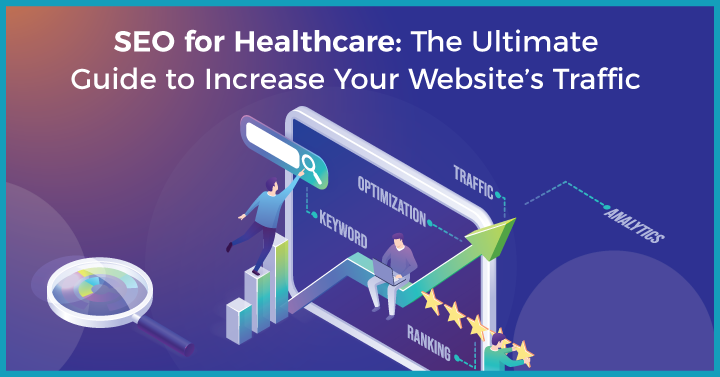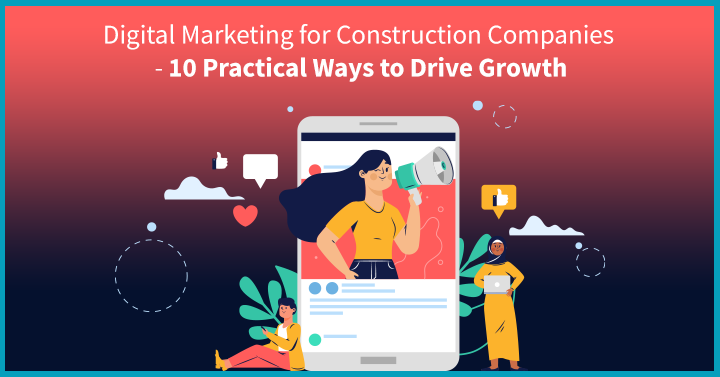Are you witnessing a decline in organic traffic of your website?
Are you grappling with the challenge of attracting qualified leads?
Do you find yourself consistently falling behind your competitors in search engine results?
If you answered yes to any of these questions, it’s time to take a step back and reevaluate your SEO strategy.
In the contemporary digital landscape, where millions of websites are competing for attention, the importance of an effective SEO strategy cannot be overstated. By understanding the nuances of SEO and implementing a well-crafted strategy, you can overcome the fluctuating organic rankings and become easily discoverable by your potential audience.
In this blog, we’ll walk you through the process of creating a robust SEO strategy that not only propels your website to the top of search engine results but also ensures sustained organic growth.
However, before that, let’s first understand the basics:
2. What is an SEO Strategy?
An SEO strategy is a detailed action plan meticulously designed to improve the online presence and rankings of a website on SERPs. It goes beyond individual tactics and focuses on a holistic approach that combines identifying the right keywords, preparing content for different stages of the customer lifecycle, building high-quality backlinks, and enhancing user experience.
The primary objective of an SEO strategy is to elevate the website’s visibility for relevant online search results, thereby driving substantial organic traffic and quality leads to the site.
2.1 Why an SEO Strategy Is Important for Businesses?
According to a stat by Demand Sage, “75% of people will never go past the first page of the Google search engine result pages”. This emphasises the importance of implementing an effective SEO strategy.
- It enhances a website’s visibility in SERPs, making it more likely for users to find your website when searching for relevant keywords.
- SEO involves optimising the website’s content, keywords, and meta tags. Hence, businesses leverage it to improve organic rankings on search engines, resulting in higher click-through rates and increased traffic.
- SEO helps businesses build credibility and trust with their target audience. By providing valuable content, optimising user experience, and earning backlinks from reputable websites, businesses can establish themselves as reliable sources in their industry.
- SEO involves optimising website speed, navigation, and mobile friendliness. This ensures that visitors easily find the information they need and have a positive interaction with the website. Ultimately this leads to increased engagement, lower bounce rates, and higher chances of conversions.
- Compared to paid media, SEO is a cost-effective strategy for businesses in the long run. While there might be initial investments in hiring SEO professionals or purchasing SEO tools, the long-term benefits outweigh the costs.
- Search engine algorithms frequently evolve, and an agile SEO strategy allows your business to adapt to these changes. Staying current with SEO best practices ensures that your website remains competitive in the ever-changing digital landscape.
3. Essential Steps to Create an Efficient SEO Strategy
Here, we have simplified the process of building a successful SEO strategy into 10 easy-to-follow steps.
3.1 Align your SEO Objectives with your Business Goals
Integrating SEO goals with broader business objectives is pivotal for digital success. This strategic integration seamlessly connects SEO goals such as increasing organic search visibility, improving keyword rankings, and enhancing website user experience with broader business objectives, such as improving brand awareness, driving conversions, and boosting customer satisfaction.
Let’s take an example, suppose a business wants to expand their local customer base by 15% in the next quarter. The corresponding SEO objective would be to optimise the website with location-based keywords and create location-specific landing pages. This would also involve listing your business on Google My Business and online directories for improved local presence.
3.2 Determine the USPs of your Product or Service Offerings
A clear understanding of your Unique Selling Points (USPs) enables businesses to distinguish their products/services from the competitors in the market. While determining these unique value propositions, it is crucial to thoroughly reflect on your business offerings. Once you’ve identified your USPs, you can utilise them to create persuasive and compelling messages.
For example, a business selling handmade, eco-friendly soaps can create a dedicated webpage highlighting their commitment to sustainable materials, unique flavours, and the meticulous handcrafted process. They can optimise meta descriptions with keywords like “handmade eco-friendly soaps” and utilise USPs to make their brand stand out.
3.3 Conduct SEO Audit of your Current Website
An SEO audit involves evaluating your website’s current state to identify if there are data structure errors, indexability issues, duplicate content, crawlability issues, broken links or 404 URLs, and hosting or server issues. It also involves checking the website’s speed, its mobile-friendliness and on-page SEO elements like heading tags, meta titles, descriptions and ALT tags
This helps in assessing website’s performance, uncovering potential issues, and identifying areas for improvement that might be hindering search engine rankings and overall website success. Conducting a comprehensive website audit will help you optimise user experience, improve online visibility, and stay abreast of the impact of changes in the SEO algorithms.
3.4 Analyse your Competitors Websites and SEO Efforts
Analysing your competitors’ SEO efforts provides an understanding of what they are doing in the digital space and helps you refine your strategy. This entails gaining insights into their keywords, content marketing strategy, backlinks information, etc. Moreover, competitor’s website and SEO analysis will be helpful to identify your weaknesses as well as opportunities to differentiate yourself.
Let’s consider a company selling resource management software. By conducting competitor analysis, they can evaluate the keywords competitors rank for and utilise the same search terms for their content resources. They can also determine link-building strategies that competitors are using to ensure that their product gains more online exposure.
3.5 Set Relevant Key Performance Indicators (KPIs)
KPIs (Key Performance Indicators) are the metrics that can help you measure the success of your SEO strategy. It helps you assess your website’s performance and identify if any adjustments are required. You can analyse the success of your SEO strategy by monitoring key metrics such as organic traffic, keyword rankings, backlinks, average CTR, average session duration, bounce rates, and crawl errors.
For instance, the goal of an e-commerce website selling fitness equipment is to increase brand awareness and attract more visitors to the website through effective SEO strategies. They can consider “organic traffic” as the primary KPI. On the other hand, the objective of the athletic shoes selling brand is to drive more sales, in this case, the right KPI to track would be click-through rates and conversions.
3.6 Perform Keyword Research and Identify Relevant Terms
Keywords are crucial elements of your SEO strategy. Keyword research is the process of identifying the relevant search terms, phrases, or queries that users enter into search engines when they are seeking information, products, or services. By targeting the right keywords, you can ensure that your website appears in the top results of search engines.
For example, a company selling natural and organic skincare products can target keywords such as such as “organic skincare,” “best organic face creams,” “natural skincare products” and “chemical-free skincare”. By incorporating these keywords in their content and meta tags, they can ensure that their products reach potential customers searching for natural skincare solutions.
3.7 Develop High-Quality Targeted Content for Audience
In simple terms, high-quality content can be defined as content that provides valuable information and effectively addresses a searcher’s query. To ensure your content stands out, you can invest in thorough research and impeccable writing. Making it informative, engaging, and presenting information in a clear manner can help you gain traction on your website.
Furthermore, creating high-quality content requires careful consideration of a few factors. These factors include understanding your audience’s preferences, interests, and pain points, incorporating keywords with high search volume, using long-tail keywords naturally into the content, enhancing the content with relevant images, infographics, or videos, and linking a few reputable sources if possible.
3.8 Implement On-Page and Off-Page SEO Techniques
On-page SEO refers to the process of optimising meta tags, descriptions, and headings. It also includes enhancing URL structure and adding internal links to improve websites ranking on SERPs and attract qualified traffic. Taking the example of fine-tuning on-page elements of an ecommerce website selling home décor products. This would include optimising meta titles and descriptions for home page with keywords like “sustainable home décor products.”
Coming to off-page SEO, it consists of a set of strategies and activities conducted outside of a website to boost the website’s visibility, reputation, and trustworthiness. Some of the key elements of off-page SEO include link building, social media mentions, online reviews and ratings, forum participation, and content promotion. Taking the same example for off-page SEO, the business would need to reach home decor influencers and bloggers for reviews with backlinks to their website.
3.9 Ensure the Website is Optimised for Technical SEO
A website may have great content, but if technical SEO is not implemented properly, it will likely fail to rank well in the SERPs. Technical SEO refers to the practise of optimising a website’s technical elements to ensure that search engine spiders can crawl and find the website more effectively. The key components of technical SEO include website crawling and speed, mobile friendliness, site security and structure, and the XML sitemap.
By implementing these technical SEO optimisations, a website can provide a smooth user experience, prevent duplicate content and penalties, and address issues like broken links. Moreover, implementing technical SEO also makes your website responsive to mobile devices. This boosts the visibility of your website on search engines and ensures that users are able to navigate your site effortlessly, thereby improving user experience and boosting search rankings.
3.10 Monitor Performance and Refine the Strategy Accordingly
Finally, the last step to create a result-driven SEO strategies involves continuously monitoring its performance. This includes regularly tracking key metrics such as organic traffic, keyword rankings, and backlinks to gain valuable insights into the effectiveness of your SEO efforts. By evaluating this data, you can identify areas for improvement and make necessary adjustments to your strategy.
For instance, a healthcare service focusing on heart and cardiovascular health implemented an SEO strategy for six months. Upon evaluation, they discovered that the keyword “top cardiovascular surgeon in Sydney” attracted significant traffic, while “heart surgeon in Sydney” underperformed. Consequently, they can optimise content around the successful keyword and refine their approach for the less effective one.
Summing up, SEO is an ever-evolving process, so plan your strategy in cyclical phases. You can start by continuously exploring, fine-tuning, and experimenting with fresh tactics to stay a step ahead of the competition. This will help you foster a sustained growth for your online presence.
Now that you know the crucial steps to create an efficient SEO strategy, let’s look how a digital marketing agency can help you create one.
4. How can a Digital Marketing Agency help?
A digital marketing agency can help you create an efficient SEO strategy as they have access to a wide range of tools and technology, a team of experts, and the latest industry knowledge that can help optimise your website for search engines.
Growth Ganik is a full-stack digital marketing agency with a team of SEO specialists who are well-versed in the latest SEO trends and best practices. We help businesses develop and implement targeted SEO strategy that enhance online presence, drive relevant traffic and generate qualified leads.
Schedule a 45-minute consultation with our experts to get a customised SEO solution that help you dominate SERP rankings.
















